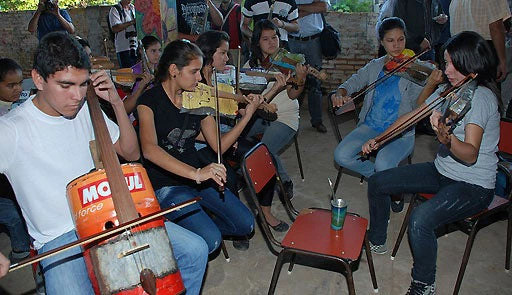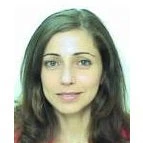
I started working in solid waste management only a few months before I heard the story of the children’s orchestra in Paraguay, called the Orchestra of Recycled Instruments of Cateura.
These talented and driven children, all from poor families, had the creativity to construct musical instruments from recycled materials and use them to play classical music (check out the video “Landfill Harmonic”). The passion of these musicians, inspired by their unique social, educational and artistic influences – as well as constraints – and their ability to create art from limited resources strengthened my commitment to the work we do in solid waste management.
Prior to learning about Landfill Harmonic, I had formed my perception of solid waste management from personal experience. While growing up, I saw many dumpsites on the outskirts of Palestinian cities and believed that the government was responsible for cleaning up the neglected land. However, time and experience taught me that effective solid waste management requires the involvement of all people.
Through my work and in the midst of the surreal world of discarded objects and memories, I gradually opened my mind to the many alternatives, possibilities and opportunities that recycling and managing waste could have on communities.
This insight inspired me to look for various approaches on how we might reduce solid waste, manage it and use it as a useful resource. I looked into the recycling work done by communities as well as the impact of some Bank projects, both directly and indirectly. I appreciated how our West Bank project supported the recycling of used tires into modern outdoor floor tiles. And, I thought of the baskets, trays and dishes that women in local communities in Nepal make out of recyclable materials.
This newfound enthusiasm turned me into an advocate on the topic. I found myself volunteering information on the importance of solid waste separation, and the actions we as individuals could take to reduce our waste – to every person who bothered to ask me about my job.
After one such discussion, one of my friends with a similar interest in the subject shared with me the short documentary about the Landfill Harmonic experiment. The message of this experiment touched me because of the empowering effect a group can have on individuals and communities through their innovative and creative use of discarded objects. Here we had a project that, through creative waste management, nurtured a relationship between communities, families and their kids, by channeling art and music.
I immediately saw solid waste management in a new light, and imagined the potential effect of such innovation on other communities within the country and around the world. Those kids who produce music with these instruments have a direct stake in reducing waste and reusing discarded materials while influencing future solid waste management habits and practices.
With many countries and cities undergoing exponential growth, recycling is one key solution that can help stem the disastrous effects on health and the environment. Currently, many of our projects are looking at the proportion of solid waste recycled, and exploring the potential of waste recycling markets.
However, managing waste is a complex task that requires changes in waste consumption patterns and behavior, use of proper technology, enhanced organizational capacity, and co-operation among a wide range of stakeholders -- including the formal and informal sectors, governments and local communities.
The concept of recycling, if integrated as a key aspect in the design and implementation of development projects, can help not only to improve outcomes but can generate a force for change in communities and the country as a whole. It can also lead to inspiring stories that bring people together through a collective effort. Just read what the musicians of the Orchestra of Recycled Instruments of Cateura have to say.
Or better yet, tell us yourselves: Have you been inspired by creative examples of how we can manage waste better?


Join the Conversation